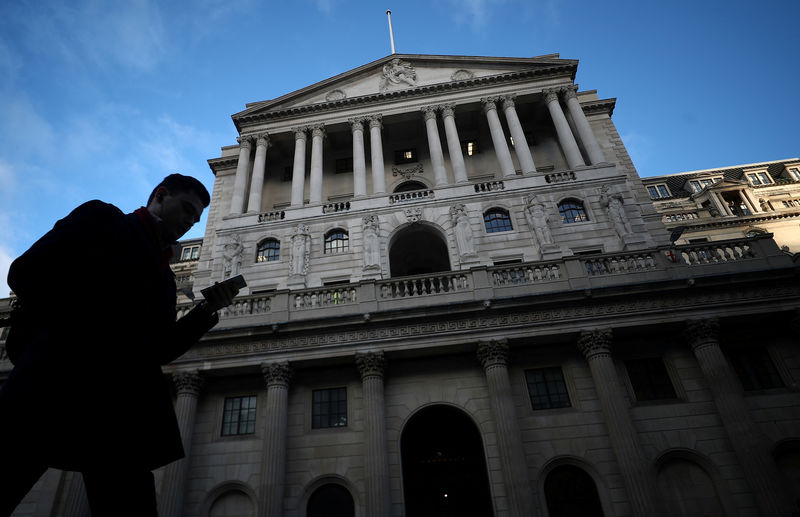By David Milliken and William Schomberg
LONDON (Reuters) - The Bank of England said Brexit uncertainty and slower world economic growth were increasingly causing Britain's economy to perform below its potential, and that a failure to reach a deal to leave the European Union by Oct. 31 would worsen the problem.
All nine members of the BoE's Monetary Policy Committee voted to keep rates on hold at 0.75% and reiterated their warnings that a no-deal Brexit risked hitting sterling and damaging growth.
But their policy minutes for the first time gave an explicit warning about the impact of a further Brexit delay, saying "entrenched uncertainty" about the terms on which Britain would leave the EU would also cause harm, albeit on a smaller scale.
Prime Minister Boris Johnson has vowed to take Britain out of the EU by Oct. 31, without a transition deal if necessary. But parliament has ordered him to delay departure if he cannot broker a fresh agreement with the EU that parliament also backs.
"Political events could lead to a further period of entrenched uncertainty," the BoE said. "The longer those uncertainties persisted, particularly in an environment of weaker global growth, the more likely it was that demand growth would remain below potential, increasing excess supply."
Sterling
The BoE described tensions between the United States and China as a "trade war" for the first time and said this was doing material damage to business investment worldwide.
"The tone of the discussion was slightly more dovish than in August," economist Thomas Pugh of consultants Capital Economics said.
Almost no economists expect the BoE to raise interest rates unless Britain leaves the EU in an orderly way.
But unlike the U.S. Federal Reserve and the European Central Bank, the BoE says it wants to raise rates gradually over the medium term, as long as a no-deal Brexit shock to the economy is avoided and global growth perks up a bit.
In the event of a no-deal Brexit, policymakers repeated their view that all policy options would be open, depending on the damage to growth and how much inflation spikes from a likely fall in sterling.
BoE Governor Mark Carney - who is due to step down on Jan. 31 - has said his personal view is that the BoE is more likely to need to cut rates after a no-deal Brexit.
Earlier this month, he estimated that in a worst-case, chaotic scenario a no-deal Brexit could reduce the size of the economy by 5.5%. On Thursday, the Paris-based OECD predicted a 2% hit in the case of a more managed no-deal Brexit.
Brexit uncertainty already appears to be weighing on productivity growth in businesses, and the labor market is no longer tightening as job creation has slowed, the BoE said.
"Recently ... entrenched Brexit uncertainties and slower global growth have led to a re-emergence of excess supply," the BoE said.
Britain's economy unexpectedly shrank by 0.2% in the three months to June, and on Thursday the BoE said its staff now predicted a small bounce-back of 0.2% in the three months to September, compared with the 0.3% it predicted six weeks ago.

Inflation, which fell more than expected to 1.7% last month, was likely to stay below 2% for the rest of this year, due to energy price regulations, before rising in early 2020.